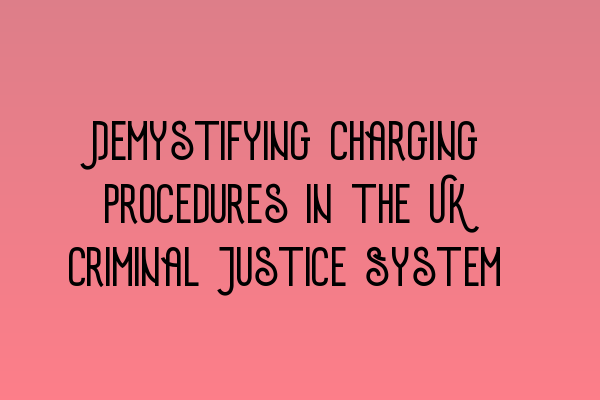Demystifying Charging Procedures in the UK Criminal Justice System
The charging procedures in the UK criminal justice system can often be complex and confusing for individuals involved in legal matters. Understanding the process is crucial for anyone facing criminal charges or working within the legal profession.
Overview of Charging Procedures
In the UK, the charging process begins when a person is arrested for a suspected criminal offense. Once arrested, the police have the authority to decide whether or not to charge the individual. This decision is made based on the available evidence and the Crown Prosecution Service (CPS) guidelines.
The CPS is responsible for determining if there is enough evidence to proceed with a prosecution. They consider factors such as the seriousness of the offense, the likelihood of a conviction, and the public interest. If the CPS determines that there is sufficient evidence, they will formally charge the individual and prepare a case against them.
The Types of Charges
There are different types of charges that can be brought against an individual in the UK criminal justice system. These include summary offenses, indictable offenses, and either-way offenses.
Summary offenses are less serious offenses that can be heard in the Magistrates’ Court. These offenses are typically punishable by a fine or a short prison sentence. Some examples of summary offenses include minor traffic violations and petty theft.
Indictable offenses are more serious offenses that must be heard in the Crown Court. These offenses carry higher penalties, including longer prison sentences. Examples of indictable offenses include murder, robbery, and drug trafficking.
Either-way offenses are offenses that fall between summary offenses and indictable offenses. The prosecutor has the discretion to choose whether the case should be heard in the Magistrates’ Court or the Crown Court. Common examples of either-way offenses include burglary and assault causing actual bodily harm.
The Charging Decision
After the CPS has assessed the evidence and decided to charge an individual, they will inform the police. The police then have the responsibility to issue a charge notice to the defendant. This notice will outline the specific offense(s) the individual has been charged with and the date and location of their court appearance.
Following the charging decision, the defendant may be granted bail or held in custody until their court hearing. The decision to grant bail is based on factors such as the seriousness of the offense and the likelihood of the defendant fleeing or committing further crimes.
Conclusion
Understanding the charging procedures in the UK criminal justice system is essential for anyone involved in legal matters. Whether you are facing criminal charges or working within the legal profession, knowing the different types of charges and the process involved can help you navigate the system more effectively.
For more information on related legal topics, be sure to check out these articles:
- Demystifying the Solicitors Qualifying Examination Format
- LLC Formation Made Simple: Step-by-Step Guide for UK Entrepreneurs
- Business Regulations in the UK: A Comprehensive Overview
- Preparing for the SQE Exam: Strategies and Resources for Success
- SQE Workshops and Webinars: Accelerate Your Exam Preparation
